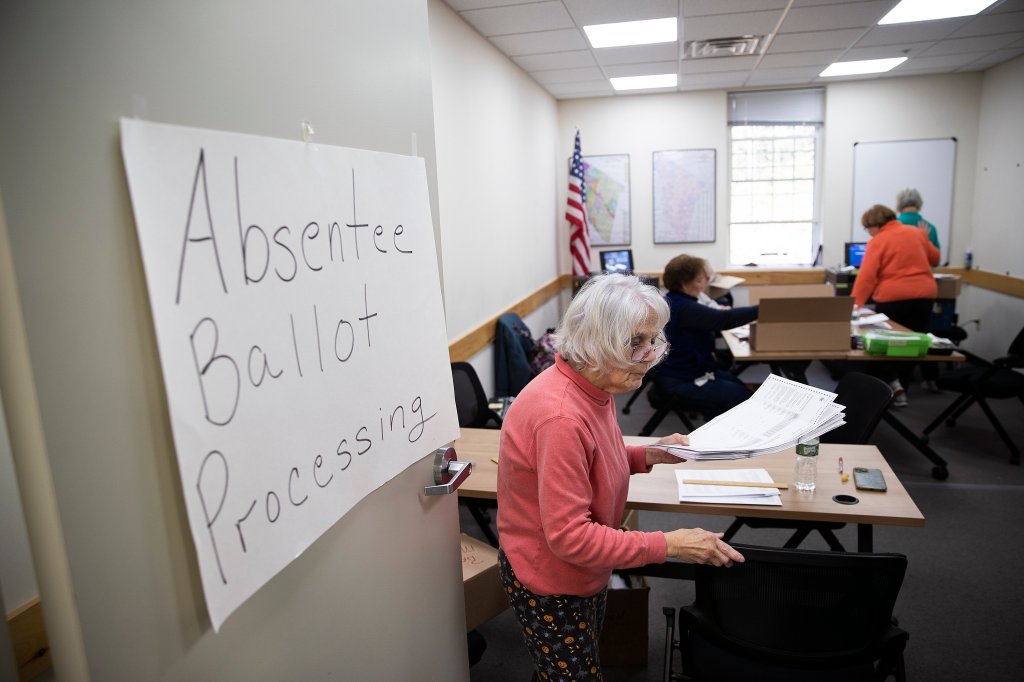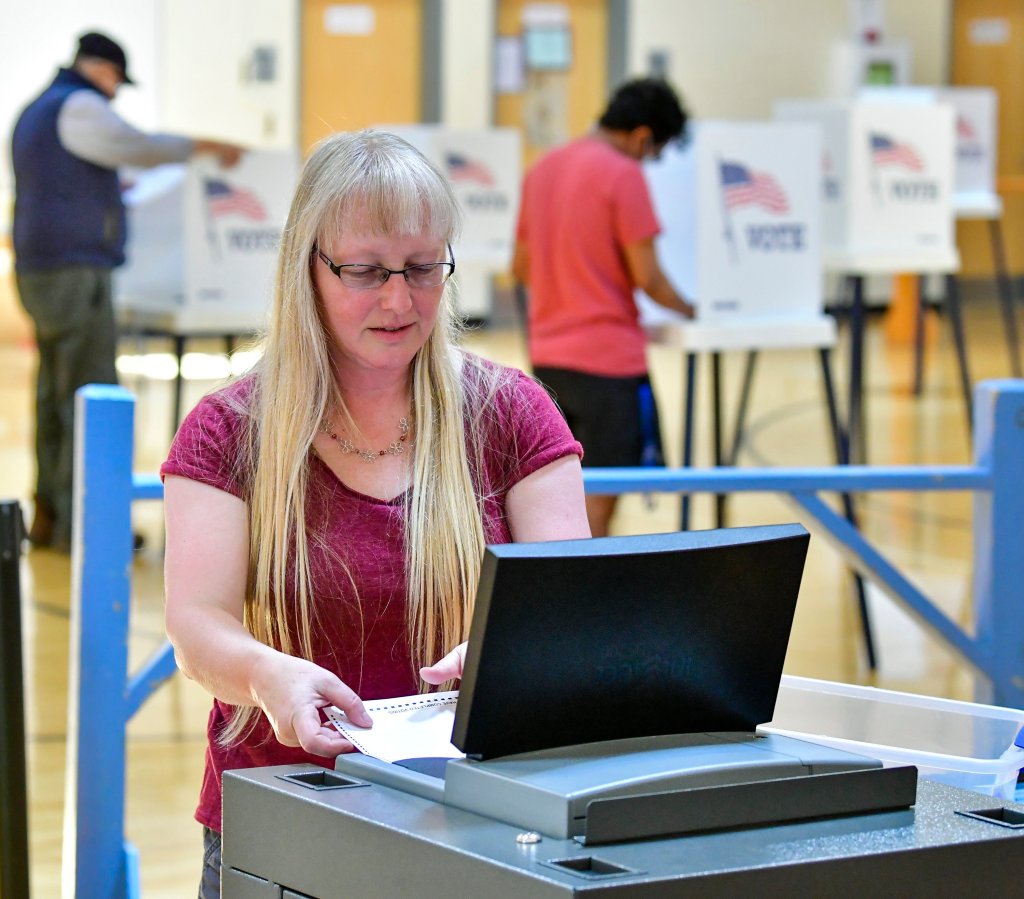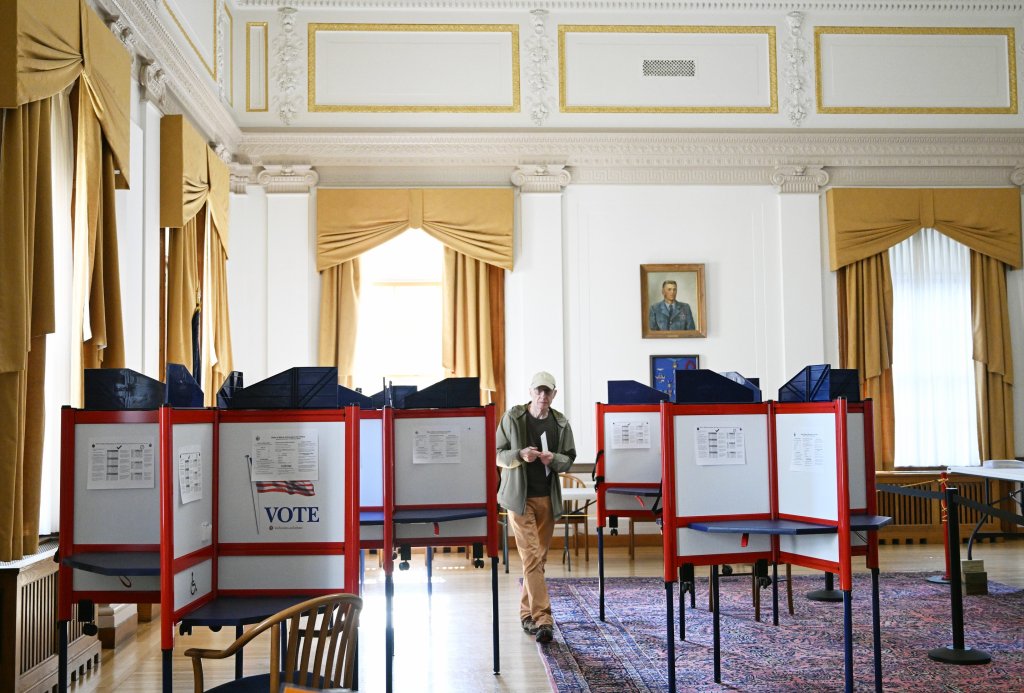
Jaynee Brooks-Robinson carries a stack of absentee ballots during processing at Windham Town Hall on Oct. 31, 2024. (Derek Davis/Staff Photographer)
Question 1 on the statewide ballot this November has largely been framed around the provision to require voter identification. But the bigger debate may hinge on changes it would make to absentee voting.
Maine voters have come to increasingly rely on absentee or mail-in ballots — a practice that is routinely targeted by Republican politicians as rife with potential fraud, even though evidence doesn’t support that.
During last year’s presidential election, almost half of all votes cast were absentee. The latest citizen-initiated proposal would make that more difficult.
If passed, it would prohibit voters from requesting absentee ballots by phone, and would require older Mainers and those with disabilities to renew their eligibility each year. The proposal also would limit the number of drop boxes municipalities are allowed to have and prohibit them from including prepaid return postage.
Those behind the referendum say those changes go hand-in-hand with requiring voter IDs.
“If voters are going to be providing their photo ID … it’s more sensitive information that’s being provided along with their vote,” said Alex Titcomb, co-founder of the conservative action group The Dinner Table and lead petitioner for the citizen’s initiative. “To increase accountability and transparency, those other changes were added into the proposal.”
But Liz Wester, campaign manager for Save Maine Absentee Voting, a group organized to oppose Question 1, said the changes will make voting more difficult and deter people from participating.
“A huge amount of Maine’s voting population uses this system, and with massive changes to it (being proposed), we think it’s really important people understand the impacts if Question 1 is passed,” Liz Wester said.
The two sides have raised more than $1.1 million combined, an indication they’ll also be spending significant money this fall to sway voters. And the referendum comes as President Donald Trump has renewed attacks on voting by mail and pledged to sign an executive order to end mail-in ballots, even though authority to set voting laws lies with states.
ABSENTEE VOTING PART OF MAINE’S HIGH TURNOUT
Maine, like many other states, saw a surge in absentee voting during the COVID-19 pandemic. And while voting by mail has since decreased, it remains more popular than in pre-pandemic years.
Nationally, states reported 33 million ballots were cast by mail in 2016 (23.7% of all ballots) — a number that jumped to 69 million in 2020 (43%). Last year, nearly 47 million (30.3%) ballots nationwide were cast by mail, according to the U.S. Election Assistance Commission. Numbers are usually higher for presidential elections than in midterm years.
Secretary of State Shenna Bellows said Maine’s high overall turnout — the state had the third-highest voter turnout in the country last November, with 74.8% of citizens of voting age casting ballots — is a reflection of the flexibility and accessibility Maine’s election system provides, including through absentee voting. Forty-five percent of Maine voters who cast ballots last November voted absentee.
“While we see great voter enthusiasm on Election Day, there are a lot of Mainers who, whether they’re working, sometimes two or three jobs, or caring for family members, simply need that flexibility to participate in absentee voting,” Bellows said.
Bellows, a Democrat who is running for governor, opposes Question 1 and said it would remove some of that flexibility.
“Reasonable people can agree to disagree on the merits of requiring photo ID to be provided with an absentee ballot or in person on Election Day,” she said. “The proposal on the November referendum goes much further to eliminate and restrict absentee voting.”
TIME FRAME FOR REQUESTING BALLOTS AMONG CHANGES
Question 1 qualified for the ballot after organizers gathered more than 170,000 signatures. Proponents say requiring a photo ID will make elections more secure, and have pointed to the prevalence of such requirements in other states.
Thirty-six states have laws requiring voters to show some form of identification at the polls, according to the National Conference of State Legislatures. Maine does not, though identification is required in order to register to vote.
Titcomb accused opponents of overstating negative impacts of the changes to absentee voting in order to get people to reject voter ID requirements.
“I just don’t see that it will be that big of an issue for folks to vote absentee, even with the new requirements once they are imposed,” he said.

While in-person voters mark ballots behind her, poll worker Sue Magee loads absentee ballots into a voting machine at Hall-Dale Elementary School in Hallowell in 2022. (Joe Phelan/Staff Photographer)
One of those changes is the elimination of two days of absentee voting just before Election Day. While current law says that the Thursday before is the last day to request an absentee ballot, the proposal would move that back to Tuesday.
Titcomb called the move “a common sense change” to ensure that ballots arrive at municipal offices in a timely manner given postal service delays, and to ease the workload for municipal clerks, who are allowed to start processing absentee ballots seven days prior to the election.
Bellows countered by saying that last year nearly 43,000 requests for absentee ballots were made in the final two days of absentee voting, more than 11% of all requests.
“In-person absentee voting in the week prior to Election Day is very popular, because ordinary people are living busy lives,” she said. “Oftentimes, they don’t start thinking about the election until we’re closer to Election Day. For people who are commuting long distances to work or working multiple jobs, that convenience of being able to vote absentee prior to Election Day is really important.”
Titcomb said the idea to prohibit municipalities from including prepaid return postage is about saving taxpayer dollars, especially since the new requirements are expected to increase postage costs for ballots. A blanket prohibition also creates more uniformity among towns, he said.
“If some towns are paying for voters’ returns but not others, that’s not fair,” he said.
The secretary of state’s office doesn’t track how many towns and cities currently include prepaid postage, though opponents of the question say it’s best left to local control.
PROPOSAL IMPACTS HOW CLERKS RUN ELECTIONS
Question 1 also limits the number of secure drop boxes a community can have to one, whereas current law allows for more with approval from the secretary of state’s office. Only two communities — Portland and Orono — currently have more than one box.
Then there are changes to who can pick up those ballots.
The referendum wants to require a “bipartisan team of election officials” to retrieve ballots and deliver them to the town or city clerk’s office, rather than the clerk or a team of two people currently designated to do that job.
Wester, from Save Maine Absentee Voting, said that could be logistically challenging.
Other critics say it would inject partisanship into a job currently done by nonpartisan staff, and could be especially difficult in small communities.
“It would mean that bipartisan teams would need to be checking those drop boxes, you know, throughout the week once absentee ballots are available,” Wester said. “It’s logistically a challenge, but it really is just undermining the trust in local election officials and town clerks.”

A voter emerges from the voting booths inside the State of Maine Room at Portland City Hall in October 2023 during in-person absentee voting. (Shawn Patrick Ouellette/Staff Photographer)
In general, Republican-led states are more skeptical of voting by mail and more likely to favor voter ID requirements, while Democrat-led states tend to favor making absentee voting more accessible, said John Fortier, a senior fellow at the American Enterprise Institute, a conservative think tank based in Washington, D.C.
Drop box access became more contentious in several states during the spike in mail voting during the COVID-19 pandemic, Fortier said, with debates focused on prevalence and security of drop boxes.
Fortier said it’s “fairly common” throughout the elections process in other states to use bipartisan teams, such as when absentee ballots are being opened. “It’s definitely parts of lots of the process … I don’t think it’s uncommon or just places on the right that require that,” he said, citing Colorado as one place where bipartisan teams retrieve ballots from drop boxes.
Fortier also noted, however, that it’s more common across the country for elections to be run at the larger county level rather than by municipality as they are in Maine. “Maybe when you have large counties, having a group of people who can go around to the drop boxes is more feasible,” he said.
QUESTION 1 ENDS ONGOING ABSENTEE VOTING
The proposal also would stop allowing people to request absentee ballots by phone and would end an ongoing absentee program that allows voters who are at least 65 years old or who self-identify as having a disability to apply to automatically receive an absentee ballot for each election without having making ballot requests each time.
That program is set to expand next year to become available to all voters.
While the number of people enrolled is not currently tracked at the state level, Bellows said disability rights advocates have said it is hugely beneficial.
A final change in Question 1 would repeal a section of law that allows family members to request an absentee ballot on behalf of a voter, though a family member could still return a ballot. Voters who aren’t able to go in-person to their town or city clerk’s office to request a ballot could still make online and mail requests.
The Maine Town and City Clerks Association says the changes in Question 1 are not needed, according to Dwayne Young, president of the association and clerk in the Aroostook County towns of Weston and Orient.
“It will hurt those that normally vote through absentee ballots, especially those that are homebound or have limited or unreliable transportation,” Young said in an email. “As for impacts to clerks, we will be the frontline contact for those who have been affected negatively by the law if passed.”
Fortier, from the American Enterprise Institute, said he couldn’t take a position on Question 1 without knowing more about it and the specifics of how Maine elections work, but he said the proposal generally seems to offer voters two choices.
“Is Maine a state that wants to have significant voting by mail and have the infrastructure and emphasize more open access there, or does it want to regulate and do some integrity protections on voting by mail and generally emphasize more voting in person?” he said.
Voters can already request absentee ballots for the November election. Towns and cities must start mailing them Oct. 6, when they will also begin offering in-person absentee voting.

We invite you to add your comments. We encourage a thoughtful exchange of ideas and information on this website. By joining the conversation, you are agreeing to our commenting policy and terms of use. More information is found on our FAQs. You can modify your screen name here.
Comments are managed by our staff during regular business hours Monday through Friday as well as limited hours on Saturday and Sunday. Comments held for moderation outside of those hours may take longer to approve.
Join the Conversation
Please sign into your CentralMaine.com account to participate in conversations below. If you do not have an account, you can register or subscribe. Questions? Please see our FAQs.